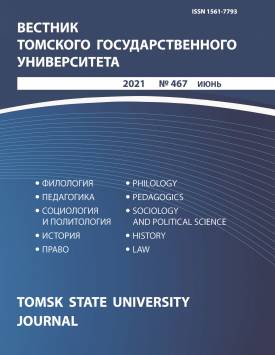Gogol’s Dead Souls in the Literary Interpretation of Mikhail Bulgakov
The article discusses the urgent issue of a contemporary work of art interacting with the text of a classical work. The subject-matter of the study is the intertextual game strategy in the artistic interpretation of Gogol’s poem Dead Souls performed by Mikhail Bulgakov. The material of the study is Bulgakov’s two texts (the feuilleton “The Adventures of Chichikov” and the play Dead Souls) and Gogol’s Dead Souls (the original work), The Government Inspector, St. Petersburg tales, and the cycle Evenings on a Farm Near Dikanka. The methodology of the article is based on the concept of dialogism belonging to Mikhail Bakhtin and on the hermeneutic phenomenology of Paul Ricoeur. Also, the article uses the methodology of “The Open Work” theory by Umberto Eco, based on the ideas of Yuri Lotman about a classical text that generates meanings and needs an interpreter. To analyze literary texts, the principles of literary hermeneutics, receptive aesthetics, structural, semiotic, cultural, and historical methods are used. The feuilleton “The Adventures of Chichikov” by Bulgakov is an intertextual game interpretation of Gogol’s Dead Souls, and it is based on the use of specific techniques that Gogol employed in his poetics. Relying on the devices of Gogol’s stylistic grotesque, Bulgakov combines poetic and formal words, which highlights the absurdity of the developing Soviet “newspeak” and the absurdity of the Soviet ideology. The appeal to the image of the rogue Chichikov and the theme of devilry allows us to correlate Bulgakov’s feuilleton with a number of rogue novels of the 1920s (Ilya Ehrenburg’s The Extraordinary Adventures of Julio Jurenito and His Disciples, Aleksey N. Tolstoy’s The Adventures of Nevzorov, or Ibicus). Bulgakov’s play Dead Souls, being as close as possible to its pretext, is more grotesque in character, which is explained by the specific worldview of the modernist writer. The game potential of the play, which is realized at all the levels of the text (semantic, stylistic, communicative, pragmatic ones), conveys a special atmosphere of Gogol’s artistic world and builds a situation of dialogue between the minds of two time-separated writers. Creating the feuilleton “The Adventures of Chichikov” and the play Dead Souls, Bulgakov fills the well-known literary frame with a new content that corresponds to the ethical and aesthetic priorities of his time. Bulgakov’s appeal to Gogol’s poetics of grotesque creates a special style, consonant with the post-revolutionary era of ideological deformations that gave rise to the phenomenon of the Soviet “newspeak”. Developing the theme of devilry that is cross-cutting for 32 Gogol, Bulgakov conveys the atmosphere of the social and historical chaos of the 1920s. In addition, through the strategy of artistic interpretation, Bulgakov the artist reflects on the fate of his great predecessor and his works.
Keywords
Mikhail Bulgakov, Nikolai Gogol, The Adventures of Chichikov, Dead Souls, literary interpretation, intertext, grotesqueAuthors
| Name | Organization | |
| Kolmakova Oksana A. | Banzarov Buryat State University | post-oxygen@mail.ru |
References

Gogol’s Dead Souls in the Literary Interpretation of Mikhail Bulgakov | Vestnik Tomskogo gosudarstvennogo universiteta – Tomsk State University Journal. 2021. № 467. DOI: 10.17223/15617793/467/3
